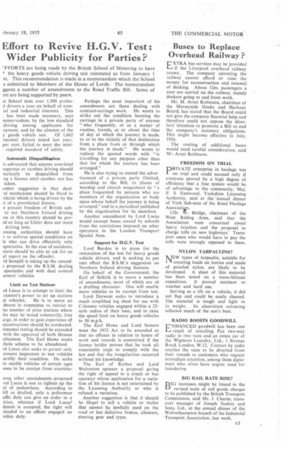Effort to Revive H.G.V. Test: Wider Publicity for Parties?
Page 43

If you've noticed an error in this article please click here to report it so we can fix it.
FFORTS are being made by the British School of Motoring to have ' the heavy goods vehicle driving test reinstated as from January 1 xt. This recommendation is made in a memorandum which the School s submitted to Members of the House of Lords. The memorandum ggests a number of amendments to the Road Traffic Bill. Some of errl are being supported by peers.
le School tests over 1,500 profesLI drivers a year on behalf of coinial and industrial interests. This has been made necessary, says nemorandum, by the low standard driving among applicants for oyment, and by the absence of the
y goods vehicle test, Of 1,662 essional drivers tested last year. per cent, failed to meet the minirequired standard of safety.
Automatic Disqualifiaation is advocated that anyone convicted tngerous or careless driving should natically be disqualified from ng a licence until another test has taken.
[other suggestion is that dual.ol mechanism should be fitted to 'elide which is being driven by the :r of a provisional licence.
e present freedom of British subto use Northern Ireland driving :es in this country should be prod so long as Ulster does not insist driving tests.
:ensing authorities should have
r to enforce special conditions on le who can drive efficiently only spectacles. In the case of accidents, ourts should be able to ask for an al report on the offender.
rd Sempill is taking up the amend s proposed by the B.S.M. dealing spectacles and with dual control arncrs' vehicles.
Limit on Test Stations rd Lucas is to attempt to limit the rnment's power to set up stations
St vehicles. He is to move an dment in committee to restrict to he number of pilot stations where les may be tested voluntarily, free arge, in order to gain experience of examinations should be conducted. rimental testing should be extended with the approval of both Houses irliament. The Earl Howe wants thole scheme to be abandoned. rd Lucas also seeks to permit only rnment inspectors to test vehicles :ertifiy their condition. He seeks to enable vehicles of certain ages tsses to be exempt from examina long other amendments .proposed rd Lucas is one to tighten up the ol of pedestrians. According to till as drafted, only a policeman affic duty can give an order to a trian, whereas if Lord Lucas' dment is accepted, the right will :tended to an officer engaged on xilice duty. Perhaps the most important of his amendments are three dealing with contract-carriage work. He wants to strike out the condition banning the carriage in a private party of anyone "who frequently, or as a matter of routine, travels, at or about the time of day at which the journey is made, to or to the vicinity of that destination from a place from or through which the journey is made." He wants to replace the quoted words with "is travelling for any purpose other than that for which the journey has been arranged."
He is also trying to extend the advertisement of a private party (limited, according to the Bill, to places of worship and church magazines) to "a place frequented by persons who are members of the organization or body upon whose behalf the journey is being arranged," and to a periodical published by the organization for its members.
Another amendment by Lord Lucas would exempt buses owned by schools from the restrictions imposed on other operators in the London Transport Special Area.
Support for H.G.V. Test Lord Burden is to press for the restoration of the test for heavy goods vehicle drivers, and is seeking to put into effect the B.S.M.'s suggestion on Northern Ireland driving licences.
On behalf of the Government, the Earl of Selkirk is to move a number of amendments, most of which are of a drafting character. One will enable more vehicles to be exempt from test.
Lord Derwent seeks to introduce a much simplified log sheet for use with C-licence vehicles engaged within a 25mile radius of their base, and to raise the speed limit on heavy goods vehicles to 30 m.p.h.
The Earl Howe and Lord Somers want the 1933 Act to be amended so that no offence in relation to hours of work and records is committed if the licence holder proves that he took all reasonable steps to comply with the law and that the irregularities occurred without his knowledge.
The Earl of Rothes and Lord Wolverton sponsor a proposal giving the right of appeal to a coach or bus operator whose application for a variation of his licence is not entertained by the Licensing Authority or who is refused a variation.
Another suggestion is that it should be illegal to sell a vehicle or trailer that cannot be lawfully used on the road or has defective brakes, silencers, steering gear and ty;es.








































































































